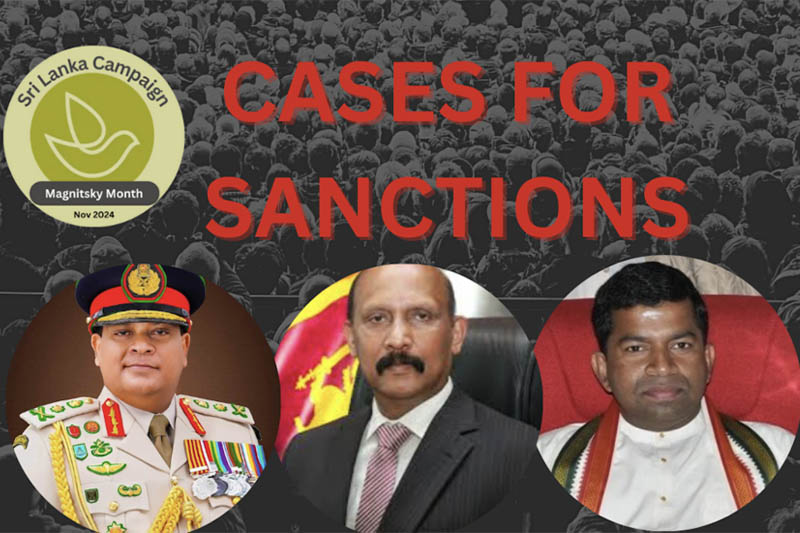The Sri Lanka Campaign for Peace and Justice is calling on the UK government to impose targeted sanctions on key perpetrators of human rights violations in Sri Lanka.
Decades after the end of the country’s brutal civil war, war crimes and atrocities remain unaddressed, with high-ranking officials implicated in abuses continuing to enjoy impunity.
The UK has a unique opportunity to advance global justice by enacting targeted sanctions against individuals responsible for these crimes, says the Sri Lanka Campaign for Peace and Justice.
In a post on its website, it says:
This November, join the effort to make Magnitsky Month a turning point in the fight against impunity.
This month, Sri Lanka Campaign are spotlighting the following three perpetrators:
Shavendra Silva – Chief of Defence Staff
Silva has been Army Commander since August 2019. As the leader of the 58th Division, Silva oversaw operations linked to mass atrocity crimes, including attacks on civilians, hospitals, and UN-designated No Fire Zones.
His division is accused of using banned weapons and committing torture, rape and enforced disappearances. Hundreds of surrendering Tamils allegedly vanished in Silva’s custody, including prominent Liberation Tigers of Tamil Eelam (LTTE) leaders who were last seen surrendering but later found executed.
As his promotion shows, Silva has faced minimal accountability; international attempts at justice, like a 2011 New York case, were blocked by diplomatic immunity, though the U.S. sanctioned him in 2020.
Kamal Gunaratne – Former Defence Secretary
Since the end of the war Gunaratne has been repeatedly rewarded by promotions to influential positions, such as Deputy Ambassador in Brazil (2012-2014), and since 2019 has been Defence Secretary in Sri Lanka.
As the former commander of the 53rd Division, Gunaratne is also implicated in war crimes, including indiscriminate attacks on civilian zones and extrajudicial killings, notably of LTTE news reader Isaipriya. Post-war, Gunaratne oversaw Joseph Camp, where torture and sexual violence were widespread.
He also managed Manik Farm, an internment camp where over 200,000 Tamil civilians suffered abusive conditions. Despite these allegations, he remains celebrated domestically and there have been no independent investigations into his conduct.
Pillayan – Leader of the TMVP and Former Chief Minister of the Eastern Province
Pillayan, also known as Sivanesathurai Chandrakanthan, has held prominent political roles in Sri Lanka, including Deputy Minister and Chief Minister of the Eastern Province. As a leader of the Tamil Makkal Viduthalai Pulikal (TMVP), Pillyan is implicated in numerous human rights abuses, including abductions, extrajudicial killings and enforced disappearances targeting both civilians and political opponents.
TMVP forces under his influence were also notorious for forcibly recruiting child soldiers. Pillyan is also connected to the 2005 murder of Tamil National Alliance (TNA) parliamentarian Joseph Pararajasingham. Arrested for this crime in 2015, he was released in 2019 under contested circumstances. Despite these allegations, Pillyan has continued to hold influential positions within the government, and there has been limited accountability for his actions.
Calls for an independent investigation into his role in human rights abuses have repeatedly been obstructed.
Magnitsky Month commemorates the life and legacy of Sergei Magnitsky, a Russian lawyer who was murdered in November 2009 after uncovering high-level government corruption.
Following his death, the Global Magnitsky Act was enacted in 2016 to allow the U.S. to impose sanctions on perpetrators of corruption or human rights abuses – no matter where they are in the world.
Other countries later followed with Magnitsky style legislation, including in Canada, the UK and parts of Europe. These sanctions often include travel bans, financial and asset freezes, and other restrictions on international dealings, effectively cutting perpetrators off from global financial networks.
Unlike broad economic sanctions, which can negatively impact entire populations, Magnitsky-style sanctions target only those directly responsible for abuses.
This focused approach minimises harm to innocent citizens of the perpetrator’s country, while isolating and limiting the freedom of the guilty.
For Sri Lanka, where human rights violations from the civil war era remain unaddressed, these sorts of sanctions offer a path towards justice.
While the U.S. has already sanctioned some Sri Lankan perpetrators under the Global Magnitsky Act, such as Shavendra Silva, other countries, particularly the UK, need to follow suit.
With a strong commitment to human rights, the UK has an opportunity to bolster the global movement for accountability and support justice for Sri Lankan victims.


